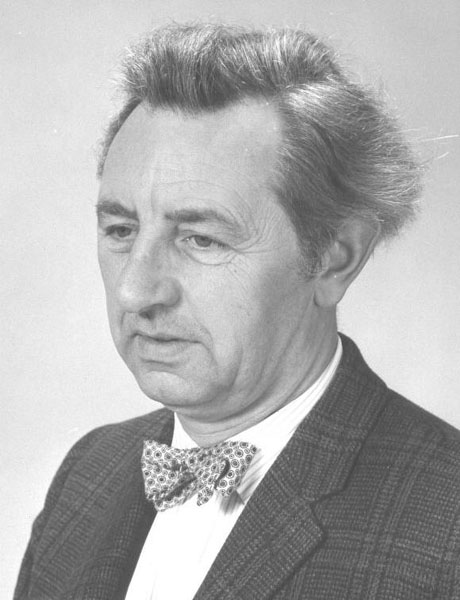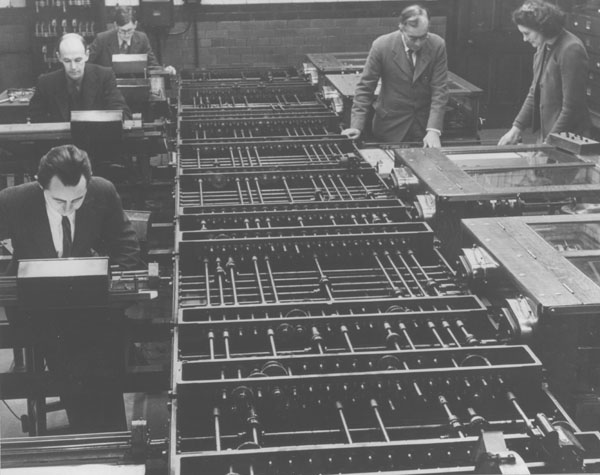

On behalf of the family, I would like to start by thanking Jim Hailstone for organising this celebration, and for giving us all a chance to hear something of the life and work of my father. Each one of us has a reason to be here. Each one of us knows something of my father, and yet I am sure that we will all learn something new about him today.
Born to a Yorkshire Mother and a Welsh Father, one of four children, all gifted with phenomenal brains and a talent for communication. I did not write that. Cousin Anthony wrote it about his father, Frank, who died about six weeks after Jack. I have to agree with that observation. I am only sorry that Esme, Jack's surviving sister, cannot be with us today. Jack married Joan in 1939. They have 5 children, 12 grandchildren and 2 great granddaughters. I am the eldest child, and three of us children are here today, together with various grandchildren. I am delighted that Joan is also here.
Jack's brother Frank also had an exceptional career - helping to develop nylon, and later as a director of ICI. He retired to run a farm in Herefordshire.
There are a few things that I would like to say about Jack's work and achievements. However I find this difficult, partly because he was not one to trumpet his achievements. He was a man of strong principles and strong views, but he was not one to impose these views on others - not even his own children. Let me start with his entry in Who's Who:
HOWLETT, Jack, CBE 1969, MA Oxon, PhD Manchester, MIEE, FSS, FBCS, FIMA, Consultant to International Computers Ltd since 1975 etc.
The whole factual entry revealed the bones of his working life, and, impressive though it is, of course it said nothing about the man. When he awarded his CBE, I got entirely wrong the pleasure that he derived from this recognition. He was a reserved, almost private, person, and yet he got much pleasure from his work and was pleased with his achievements.

He gained a First from Manchester University - indeed he once told me that his year was exceptional, with more Firsts than usual being awarded, and that his First was the top one. He read mathematics because he enjoyed it. His first job was with the newly set up LMS Railway research Department at Derby. He maintained a constant love of and interest in the railway throughout his life. He was also much pleased when my eldest son Adrian gained university sponsorship from British Rail's successor to that research department.
During the war he was sent to work for the Projectile Development Establishment in west Wales. he was then summoned back to Manchester. there, according to his brother, Frank, it was work on something called a computer - necessary to help with solving the German Enigma codes. According to notes that Francis found, it was work on an analogue type of computer called a differential analyser, which seems to be rather different. Whatever it was, there was bound to be classified work involved, and father did not talk about that - at least, not to me.

After a second spell at the LMS Railway he was invited to lead the computing support team for the Theoretical Physics Division of the newly created AERE Harwell. While there, he and some colleagues made proposals as to the kind of very powerful that Britain should be building, and of the kind of service that it should be providing. I would like to read out one of the proposals that were made (as described later in his own words): A stated amount of time, which we estimated as about one third, that is, one eight-hour shift, should be made available to British universities for research work needing large-scale computing resources. This was to be without charge and as a right. I cannot help but feel that Jack more than just strongly supported this aspect of the proposal. It shows him as a person who cared about his fellow citizens, and it accords well with my view of him.
The proposed machine was built - it was called Atlas. Jack got the job of running the Atlas Computer Laboratory, and the family knows what that cost him to get it up and running. Atlas and its associated laboratory were a land-mark. I am sure that it was for that reason that Jack was awarded the CBE while working as its Director. I would also like to mention one aspect of his running of this laboratory. He regularly had young people from this and other countries working for him on short-term contracts, to give them the experience of working in such an environment, and he was always most particular to make sure that these people were properly cared for, housed and happy. Kate Crennell, who worked under him at Atlas, wrote He always took a great interest in his employees, their families and their problems. He encouraged research in areas which are commonplace applications of computers today but which were unheard of then.
After his retirement, he seemed to work even harder, although it was now part time. As ever, he enjoyed his work, and kept himself abreast of developments in all sorts of areas with mathematical and computing connections. He also became quite well known as a translator of French textbooks and monographs, some of which seemed to involve him in learning whole new fields of mathematics.
But why do we, that is his family, remember and love him?
For me, it was his love, his love of life, his love of his wife, his love of his family, his love of his work. This love was not of a cloying, or over-bearing, or over-protective nature, but it was very real. One of Elizabeth's pictures of him is of a person who, when he meets a friend, no matter where greets him or her with great animation and genuineness, always ready to give his time. Especially I want to recall his love for and of Joan for over sixty years.
And what was Jack's actual influence on his children? An impossible question. He had a fabulous brain, better I am sure than of his children individually. But he had a wide range of interests, which have become dispersed among the professional lives of his children and grandchildren.
Jack had many other loves. His love of pictures and fine art, strongly shared with Joan. His love of walking - he was regularly walking the hills of the Lake District until very recently. Right to the end he was walking round the University Parks in Oxford, taking an interest in all that is there, especially the trees. His love of European culture. Us five children must have been an expensive undertaking, but never mind, Jack and Joan happily packed their tent in the car and toured Europe, east and west. His love of books - his library shows an incredible range of interests, far greater than I have ever aspired to - and along with this was his ability to remember what he had read. He had a charming facility to quote all sorts of appropriate poetry.
And finally there was his love of music. He did try to learn to play the piano, but when asked, he usually only professed to play the gramophone, but he did build up a most extensive range of records covering a wide range of styles, though with a tendency towards chamber music, lieder, and the like.
We would like to thank all for coming to this celebration of my father's life.